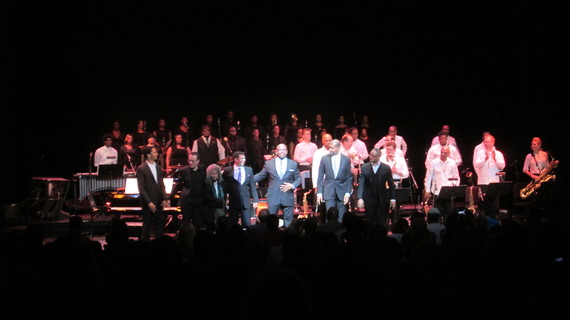 Christian McBride's Big Band with the singers and narrators taking bows after performing The Movement Revisited in Philly (photo LJW)
Christian McBride's Big Band with the singers and narrators taking bows after performing The Movement Revisited in Philly (photo LJW)
Christian McBride's The Movement Revisited, had one knockout performance at the Merriam Theater in Philadelphia Nov. 21. It's an ambitious jazz oratorio- symphonia inspired by the lives of four iconic figures of the black civil rights movement.
In remarks before the performance, McBride thanked his grandmother for "never throwing anything away" and saving old Jet and Ebony magazines that gave him a "history lesson" on the civil rights movement of the 50s and 60s.
The piece is "written around" the stirring words of Rosa Parks , Malcolm X, Muhammad Ali and Dr. Martin Luther King, defining the Movement. Themes as big as this, not to mention the larger than life heroes of the movement looming large, could present problems, musically, no matter how carefully composed. McBride brings message and music brilliantly together.
He composed a instrumental section for his quartet initially in the late 90s, then when he was named head of jazz programming at the Los Angeles Philharmonic in 2008, they commissioned him for a full orchestral-choral piece. He told the audience, that he wanted to bring it to his hometown Philly audience, with his stellar 18-piece big band.
The percussive drive of McBride's bass, vibraphonist, pianist and drummer, the driving engine at the musical heart of The Movement. JD Steel conducts the vibrant Philadelphia Heritage Chorale (J. Donald Dumpson, musical director) and comes center stage on a couple of numbers. The Movement blends different jazz styles and different musical era -- from propulsive brass of hard -- bop to blues gospel to mis-en-scenes of 60s cool jazz and soaring chorale transitions.
Standing on each side of the stage throughout the performance were poet Sonia Sanchez as Rosa Parks); The Rev. Alyn Waller as Dr. King, actors Dion Graham as Muhammad Ali and Samuel Strickland as Malcolm X.
Significantly, less famous passages giving them even more dimension in the piece. Malcolm X's 'By any means necessary' is there, along with his more ecumenical views on religion and race. Parks was a longtime civil-rights activist, describing the character of Malcolm X, for instance, gives a larger picture to her activist work throughout her lifetime. All of the narrators captured essences of the real people and Sanchez as Parks, particularly, has such a jazz immediacy in her cadence as she performed Park's words.
A big band blowout engulfed the Merriam Theater during 'The Rumble in the Jungle' after Ali's words about how he played at being 'The Greatest' in part as a rejection of what the image of a black man in the US. Then the musicians weigh in, with two heavyweight sax players depicting Ali and Foreman dukeing it out with blistering notes. Drummer takes over and the rapid fire knockouts he is landing on those skins has more to do than Ali's fights in the ring.
Dr. King's 'I Have a Dream' speech is there in its entirety and McBride makes it, indeed, a majestic symphonic-chorale. It begins with McBride plucking the most sonorous notes rhythmically as drummer beats the drum in a somber march. The orchestra subtly building under the words as Alyn Waller's voice rises with the finale and the choir picking up the refrain 'free at last' by voice category singing out ala heralding a new day.
The Movement revisited resonates more than ever as racism and racial divides in this country remain as prevalent as ever. The section about Parks' arrest for refusing to move her seat to the back of the bus is further dramatized in song by Maria Caldwell, her fierce mezzo building until she crashes it, to a primal scream of freedom that speaks to that time and to ours.
